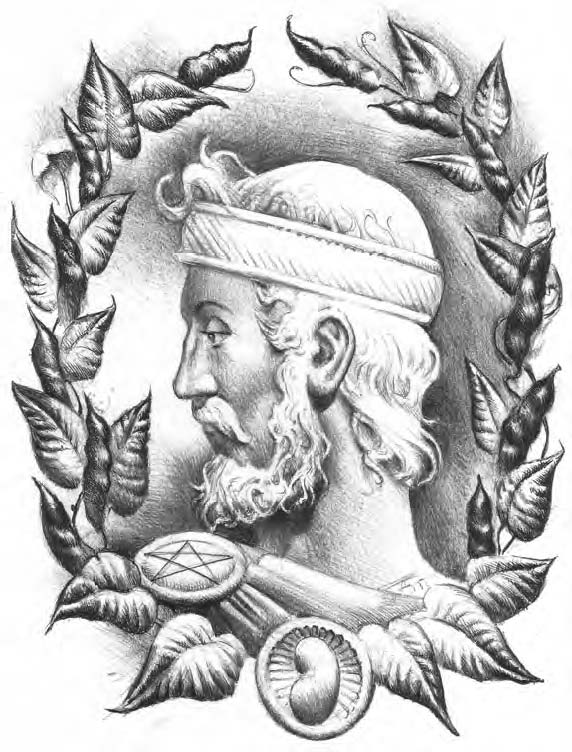Portrait of Pythagoras by Bruce Pennington 2010
"Alexander in his Successions of Philosophers says that he found in the Pythagorean memoirs the following tenets as well. The principle of all things is the monad or unit; arising from this monad the undefined dyad or two serves as material substratum to the monad, which is cause; from the monad and the undefined dyad spring numbers; from numbers, points; from points, lines; from lines, plane figures; from plane figures, solid figures; from solid figures, sensible bodies, the elements of which are four, fire, water, earth and air; these elements interchange and turn into one another completely, and combine to produce a universe animate, intelligent, spherical, with the earth at its centre, the earth itself too being spherical and inhabited round about. There are also antipodes, and our “down” is their “up.”
Light and darkness have equal part in the universe, so have hot and cold, and dry and moist; and of these, if hot preponderates, we have summer; if cold, winter; if dry, spring; if moist, late autumn. If all are in equilibrium, we have the best periods of the year, of which the freshness of spring constitutes the healthy season, and the decay of late autumn the unhealthy. So too, in the day, freshness belongs to the morning, and decay to the evening, which is therefore more unhealthy. The air about the earth is stagnant and unwholesome, and all within it is mortal; but the uppermost air is ever-moved and pure and healthy, and all within it is immortal and consequently divine.
The sun, the moon, and the other stars are Gods; for, in them, there is a preponderance of heat, and heat is the cause of life. The moon is illumined by the sun. Gods and men are akin, inasmuch as man partakes of heat; therefore God takes thought for man. Fate is the cause of things being thus ordered both as a whole and separately. The sun’s ray penetrates through the aether, whether cold or dense – the air they call cold aether, and the sea and moisture dense aether – and this ray descends even to the depths and for this reason quickens all things. All things live which partake of heat – this is why plants are living things – but all have not soul, which is a detached part of aether, partly the hot and partly the cold, for it partakes of cold aether too. Soul is distinct from life; it is immortal, since that from which it is detached is immortal.
Living creatures are reproduced from one another by germination; there is no such thing as spontaneous generation from earth. The germ is a clot of brain containing hot vapour within it; and this, when brought to the womb, throws out, from the brain, ichor, fluid and blood, whence are formed flesh, sinews, bones, hairs, and the whole of the body, while soul and sense come from the vapour within."
-Laertius, Diogenes. Delphi Complete Works of Diogenes Laertius (Illustrated) (Delphi Ancient Classics Book 47) (p. 318-319). Delphi Classics. Kindle Edition.
 |
| Portrait of Pythagoras by Bruce Pennington 2010. |
Source:
http://www.brucepennington.co.uk/general.htm#pythagoras
https://philosophynow.org/issues/78/The_Death_of_Pythagoras
Quote:
Laertius, Diogenes. Delphi Complete Works of Diogenes Laertius (Illustrated) (Delphi Ancient Classics Book 47) (p. 318-319). Delphi Classics. Kindle Edition.



Comments
Post a Comment